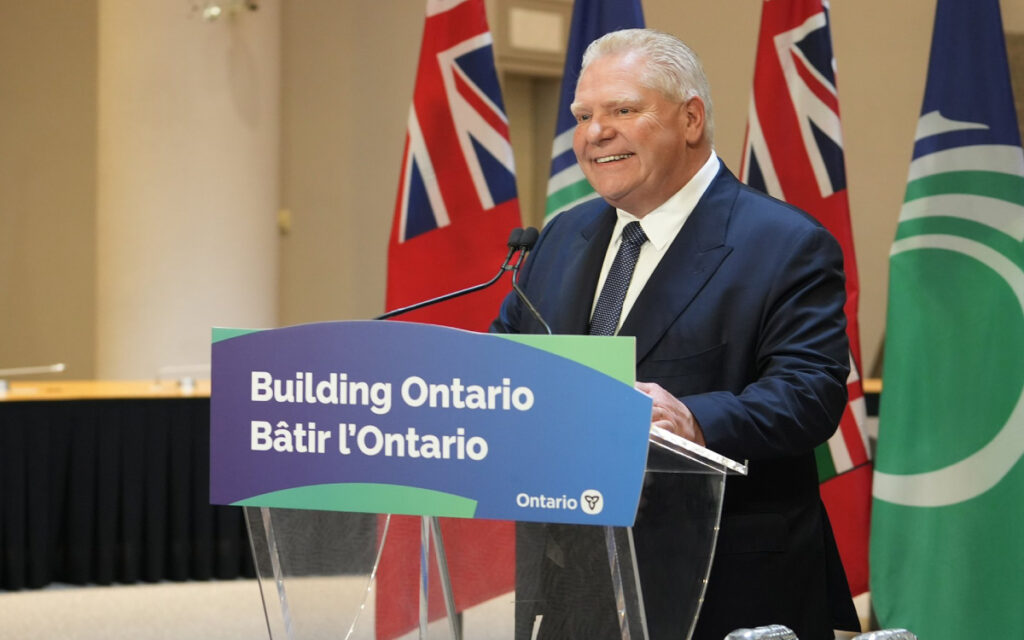
Ford’s practice of giving nearly everyone in his caucus pay bumps reflects his free spending approach to the province’s budget. Pictured: Ontario Premier Doug Ford. Photo Credit: Doug Ford/X.
It’s like a bad joke. How many politicians does it take to screw in a light blub? Nobody knows for sure, but apparently it takes more Conservative than Liberals.
To go along with Ford’s largest cabinet in Ontario history, Ford appointed the longest roster of parliamentary assistants in the province’s history: 38.
Previous governments used to appoint one parliamentary assistant per cabinet minister.
But Ford has decided to change things.
He appointed two parliamentary assistants for: agriculture, social services, citizenship and multiculturalism, education, energy, finance, health, seniors and accessibility, and the treasury board.
Was the treasury board really struggling to manage with only one parliamentary secretary? That doesn’t sound like a real problem.
So why might Ford have decided to include a roster of parliamentary assistants greater than the number of days in a month? Why do so many cabinet ministers need two assistants to do one job?
A cynic might point to the $16,600 salary bump for each of those parliamentary assistants.
Ford’s largest list of parliamentary assistants in Ontario history pairs is in addition to his largest cabinet in Ontario history.
There are currently 30 members of Ford’s cabinet. Included in that list are five associate ministers, whose jobs serve no vital purpose.
For example, Ford has both a minister of housing and an associate minister of housing. He has a minister of transportation and an associate minister of transportation.
What could explain this laundry list of redundant cabinet roles?
Once again, a cynic might point to a $49,350 pay increase for each of those apparently indispensable roles that we lived without until quite recently.
If you add the size of Ford’s cabinet to the size of Ford’s parliamentary assistant roster, you get the number 68.
That leaves 10 Tory MPPs without a pay raise. Until, that is, you take a gander at the list of committee chairs, whips and the speaker.
Six Progressive Conservative MPPs hold committee chair roles. One is a vice chair. The caucus also has a whip and a speaker. They all get pay bumps.
That leaves just one Progressive Conservative MPP without a special role: former cabinet minister Lisa MacLeod.
Most opposition MPPs only earn base pay, but every Tory save one is getting a taxpayer-funded pay hike.
The culture of bloat Ford is bringing to Queen’s Park is a far cry from the Progressive Conservative Party’s old attitude toward the size of government.
Vic Fedeli, now Ontario’s chair of cabinet, blasted former premier Kathleen Wynne for appointing a cabinet of 26 ministers, along with 23 parliamentary assistants, back in 2014.
“Our party continues to talk about a very small cabinet of 16 and that would send a strong signal that she’s paying attention to some of the needs of Ontarians,” said Fedeli.
Maybe Fedeli needs to pay closer attention because he now chairs a cabinet nearly double that size.
Ford’s first cabinet had 21 members. It’s now 43 per cent larger, but you’d have a hard time finding anyone outside PC caucus who thinks it is 43 per cent more effective.
Ford’s first roster of parliamentary secretaries included 26 MPPs. That number is now 46 per cent higher.
These special jobs and salary increases are costing Ontario taxpayers nearly $1 million a year.
While that may not sound like a lot of cash for a government that rolled out a budget of more than $200 billion just weeks ago, what matters is the culture and tone being set.
Ford’s practice of giving nearly everyone in his caucus pay bumps reflects his free spending approach to the province’s budget.
Ontario taxpayers are sick and tired of Ford’s refusal to get the size of government under control. Ford needs to show leadership by slimming down the size of his cabinet and pairing only one parliamentary assistant with each minister at the most.
After that, Ford needs to slim down the size of government. That means a full spending review, a balanced budget and a smaller bureaucracy.
Ontarians elected Ford on the promise to end the gravy train at Queen’s Park. It’s time the for the premier to remember that promise and show leadership from the top.

Jay Goldberg is the Ontario Director at the Canadian Taxpayers Federation. He previously served as a policy fellow at the Munk School of Public Policy and Global Affairs. Jay holds a Ph.D. in Political Science from the University of Toronto.






